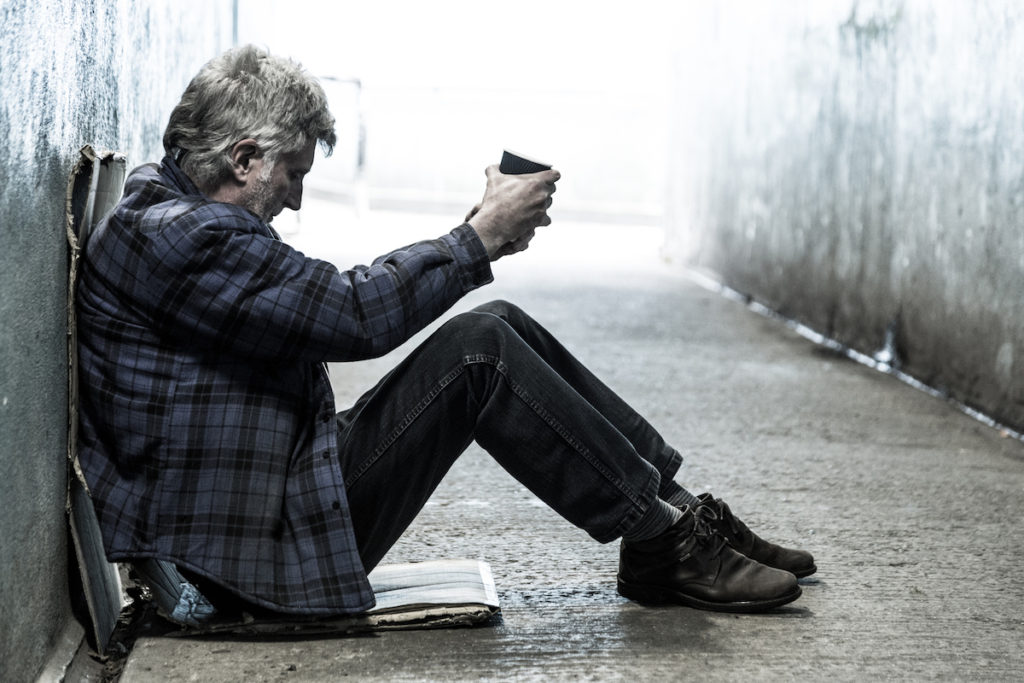Lorelie Rozzano is a guest blogger for Vertava Health.
Two Myths That Are Deadly To Addicted Persons
I’ll never forget the first time I saw a homeless man. I was walking beside my Mother on Vancouver’s east side, a part of town notorious for addicted, mentally ill, homeless persons. The disheveled man was slouched up against the building, shouting at the people walking by. My mother clutched my arm tightly and whispered, “Don’t look at him.” My Mother’s fear was unmistakable as she rushed us passed him to safety. Out of earshot, I asked my mother what was wrong with the man. She replied, “He’s a drug addict and alcoholic.” Looking back, it’s strange my mother would react that way. After all, she lived with an alcoholic. My Dad was a closet drinker. He held down an important job in management, in a company with thousands of employees. During working hours he wore a business suit. At home, the suit came off and the bottle came out. He would drink until he passed out. My mother’s idea of what an addicted person looked like stayed with me for a long time. When I crossed the line into addiction myself, I didn’t know it. Sure I drank too much. Yes, I did drugs. But I still had a roof over my head and a job to go to. I wasn’t dirty, or disheveled. As long as I wasn’t homeless, I wasn’t an addict. Many years later I came to learn the majority of the addicted population has a roof over their head. Most are working and raising families. We aren’t holding up buildings or shrieking at people as they walk by. Myths like addicted persons are homeless, are dangerous. Believing this allowed me to deny the seriousness of my illness and kept me from seeking help. Since then I’ve heard numerous untruths and myths regarding addiction. For example, you can’t get addicted to marijuana or drinking beer is harmless. But there are two myths I hear over and over again that are deadly to addicted persons.
Myth One – The addicted person must hit rock bottom.
Substance users are gravely unstable. Addiction thrives in delusion. I came up with many plans to try and gain control of my disease. Plans like; I’d only drink on the weekends. But every time I drank, I bought drugs, and then I’d be off on a three-day binge. I’d limit the amount of money I took with me. My partner would keep my credit cards, bank cards and hold onto my cash. I asked him to dole out my pills and allow me only the amount prescribed. I tried everything I could to stop the damaging effects alcohol and drugs created in my life. But nothing worked. When I wasn’t using, I was miserable in my skin. I couldn’t abstain for long. Once I picked up, the need for more was on. It was bigger, meaner and far more powerful than I was. Eventually, I gave up trying to control it. When you lose the ability to control your usage, the drug chooses for you. Apathy sets in. You stop caring about everything, even if you live or die. Only one thing is important… MORE. From there it’s all downhill. I became a puppet, something more powerful than everything I loved was calling the shots. I lost everything. My job, my home, my family. There was no magical bottom where health and sanity were restored. When you have no stop button, rock bottom is six feet under.
Myth Two – If the addicted person doesn’t want to go to treatment it won’t work.
When I entered rehab I wasn’t happy. My family gave me an ultimatum – us or drugs. I chose drugs. But when I ran out of money, drugs and options, I did what I always did; I asked them to bail me out. When they refused, I was left to take responsibility for the problems I had created. After being evicted from my home and spending a night on the streets, I entered treatment. I did not want to get clean and sober. I just wanted the consequences to stop. My plan was to stay in treatment long enough to detox and then I would leave. For the first few days, all I thought about was going. I scrambled to come up with a way to do it. I’d always been able to manipulate people into giving me what I wanted. Only this time I couldn’t. The counselors saw right through me. So did my peers. With nowhere to go and no place to run, I was forced to stand and deal. Away from the chaotic lifestyle of addiction, and no way to get my hands on more drugs, I began to heal. Since then, I’ve had the pleasure of helping hundreds of addicted persons get well. No one walking in through the front doors of rehab wants to be there. Most come to treatment because they will lose something important to them if they don’t. That something can be their spouse, job, family or life. With the right help, long term treatment, psychiatric oversee, medical detox, master degree therapists, cognitive behavior therapy, healing family relationships, intensive outpatient programs, sober living and aftercare, recovery can and does occur. If you’ve heard these myths before, don’t buy into them. Addiction is a terminal illness. The best time to seek help for you or a loved one is now. I am lucky to be alive. Every day I wake up thankful to the people who helped me, when I couldn’t help myself. If you or someone you know needs help, please call this confidential support line for assistance 844-470-0410.


